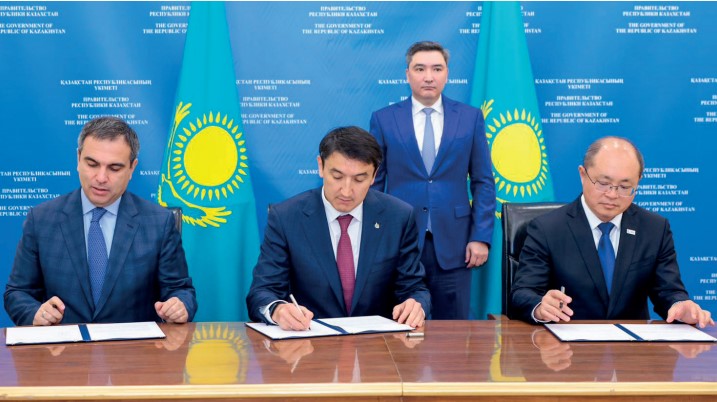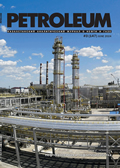Petrochemistry and oil refining
Kazakhstani Polyethylene Finds Partners in Russia and China
The legal formalities for the "Polyethylene" project, which involves the construction of a polyethylene production plant in the Atyrau region, were completed in mid-April. The project is now moving into the implementation phase.
On April 19, in the presence of the Prime Minister of the Republic of Kazakhstan, Olzhas Bektenov, Chairman of the Board of KazMunayGas Magzum Mirzagaliyev, President of China Petrochemical Corporation (Sinopec) Zhao Dong, and Chairman of the Board of SIBUR LLC Mikhail Karisalov signed a protocol finalizing the official entry of Sinopec into the project. From this day forward, the ownership structure of the plant is as follows: KazMunayGas – 40%, Sinopec – 30%, SIBUR – 30%.
 Agreement signing, April 19, 2024. Photo: Government Press Service
Agreement signing, April 19, 2024. Photo: Government Press Service
The Long Road to Polyethylene
The country's first president, Nursultan Nazarbayev, decided to construct Kazakhstan's first gas-chemical complex in 2012. In his traditional annual Address to the People of Kazakhstan, he instructed the government to "ensure the commissioning of the Atyrau Gas-Chemical Complex worth $6.3 bln. At full capacity, it should produce 500 thousand tons of polypropylene and 800 thousand tons of polyethylene annually. We have not produced such products in Kazakhstan," noted Nursultan Nazarbayev.
The ambitious project was designed to meet the polyethylene needs of the entire Central Asian region. The project partners, holding equal shares, were United Chemical Company LLP, a subsidiary of the state fund Samruk-Kazyna, and the Korean conglomerate LG. A tender was held to select an EPC contractor, with Hyundai Engineering, DAELIM, Samsung Engineering, and SK Engineering and Construction participating.
However, in January 2016, LG Chem notified its Kazakhstani partner of withdrawing from the project, citing a reassessment of plans due to the current market conditions in the oil industry. Kazakhstan had to start looking for a new partner, which eventually became the Austrian company Borealis, joining the project in March 2018.
Negotiations with Borealis lasted about two years. Securing a supply of raw materials (ethane) at an acceptable price was a key condition for the project's implementation. The foreign partner also insisted on signing a Government Support Agreement (GSA)—an investment agreement outlining the main conditions for investment protection and investor preferences.
"Borealis demanded guarantees of a certain level of economic profitability for the project. To meet these requirements, a deal configuration was discussed in which, if the project's cost increased, all additional expenses would be paid by the Kazakhstani side, represented by Samruk-Kazyna," Askar Ismailov, a participant in the negotiations from the Kazakh side, who at the time oversaw gas-chemical projects at Samruk-Kazyna, told Petroleum. "As part of the GSA discussions, the Austrian investors also demanded unprecedented privileges. For example, Kazakhstan had to agree to have all disputes resolved in the International Investment Court (which is focused solely on protecting investor interests). Additionally, the state was required to provide perpetual privileges, effective even after the contract's expiration – beyond 2060, among other things. The Kazakh side did not accept the conditions put forward by the Austrian company, although it proposed several compromise options in return. As someone directly involved in the negotiation process, I can say this unequivocally."
As a result, in May 2020, Borealis decided to withdraw from the project. Given the circumstances, potential investors from South Korea, the USA, China, and Russia were considered. Ultimately, the most realistic negotiations were with the Russian company SIBUR.
Following the onset of military actions in Ukraine, cooperation with SIBUR presented significant risks for the Kazakhstani side – the Russian company could be sanctioned at any moment. These risks needed to be shared, and they were divided with the Chinese partner.
Moreover, Sinopec is not a stranger to SIBUR; it holds a 40% stake in the joint project to build the Amur Gas Chemical Complex in the Russian Far East with a capacity of 2.3 mln tons of polyethylene and 400 thous. tons of polypropylene per year. Sinopec, with an 8.5% stake, is one of SIBUR's shareholders.
Project Parameters
Thus, in August 2024, the key parameters of the Kazakhstani project were finally determined and agreed upon. The capacity of the first integrated gas-chemical complex for polyethylene production in Kazakhstan will be 1.25 mln tons per year, approximately 1% of global capacities. The project's investment volume is around $7.7 bln, with KazMunayGas (KMG) reporting that both partners' funds and borrowed capital will be utilized.



